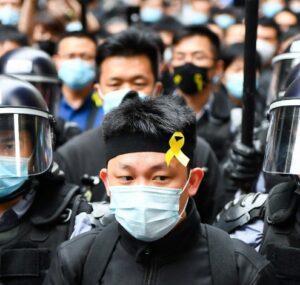A Call to Courage!
by Bruno Waterfield

Her name was Shanti De Corte. .
Shanti was at the departures area of Brussels airport on March 22, 2016 when Islamic State suicide bombers struck. She and other classmates, aged 16 to 17, were on their way to Rome to celebrate the end of exams at school.
The bombers killed 14 people, who died in the blast. Shanti was lucky. She was close by but survived.
Six months later she was diagnosed with severe post-traumatic stress disorder and depression. Haunted by the horrors of that day, she spoke of her crushing sense of guilt at trying to flee, leaving her friends, as the airport ceiling crashed down on her. She was open about her struggle and a suicide attempt a year after the bombing.
On May 7 this year, aged just 23 – 23! – Shanti died. She was given, at her request, a lethal injection in an Antwerp hospital on the grounds, defined by two psychiatrists, of unbearable psychological suffering caused by untreatable depression. This is legal under Belgium’s euthanasia legislation. Her case has only emerged in recent weeks because of concerns raised by one doctor who had offered her treatment rather than death.
I tell this story not to criticise or slight Shanti – her death is a tragedy. But as a lesson, a cautionary tale, that reveals the defeatism, bordering on nihilism, that is prevalent in many European societies.
This was a young woman with her life ahead of her. It is the duty and obligation of all of us to fight for life, to help people – especially those in authority with responsibilities for the welfare of the vulnerable.
If you were walking across a high bridge and you saw a distressed young woman standing outside the railings about to jump, what would you do? Would you ask her if she needed a hand and then push her off? Or would you hold to her tight, calling to other passers-by to come and help?
Shanti’s death tells us how little in Western societies we are ready to fight. In terms of at least one life, Belgium finished the work of those suicide bombers by giving up on the struggle to give Shanti a future. After what she saw that day surely society had, if anything, a special duty to her?
Her case raises questions beyond her own or any individual’s survival. These are questions for all of us. This act of resignation, of defeatism – to paraphrase Sartre – is society’s will for everyone, an action in consequence that is a commitment on behalf of all mankind.
Defeatism is the very opposite of courage. It is to turn tail from struggle because of an outlook and ideology that diminishes, even stigmatises, people’s capacity to fight for a future. She was young and it was time to fight. She faltered and society acted on her behalf, with an irrevocable surrender.
Life is a struggle. There is darkness. There is evil. We all have a duty, to be brave enough to struggle on ourselves, sure, but most importantly to have the courage to reach out a hand to others, to hold on to the principle that all lives are worth a fight. Some things are worth fighting for – always and forever, especially at the darkest hours before dawn can come. Shanti’s tragic death tells us that many do not grasp this.
Courage is more than bravery. It takes us beyond ourselves to defy fate, to resist what the so-called realists, (or psychiatrists), tell us is inevitable. It pushes us out into a world of principle, of free speech, equality, justice, and solidarity, the obligation to help weaker people, not to walk on by.
Take patriotism. Our societies stigmatise patriotism because it directly confronts a dominant culture of defeatism. It is a declaration that something – our country, our communities, our territory, our borders, our people – is worth fighting for.
Courage is not passive. It is not to be sacrificed, as a pawn on the killing fields of the First World War, for example. It is the active, volunteer spirit of defying the odds, to take a stand, to fight for our world.
History is this virtue, the refusal of people now and generations before us to bow to fate or defeatism. Or else it would have been the dark ages forever.
We make history, all people. Yes, of course, in circumstances not of our making, often in situations of struggle and adversity. Even of war as we see in Ukraine.
Courage, as Hannah Arendt put it, is to leave the protective security of our four walls at home to enter a new realm of struggle, of politics. This takes us outside of the routines of everyday life, and gives us new horizons beyond our daily work or life. She wrote: “Courage is indispensable because in politics… the world is at stake.”
Courage is when we live for the world. That is the impulse that makes history and that should guide our lives. As Churchill said: “Courage is the first of the human qualities because it is the quality which guarantees all others.”
With courage we can take a stand against the weight of circumstance or the juggernauts of realism and orthodoxy.
It is our duty to defy defeatism if we want to preserve or improve our world, our freedom, or solidarity. All human qualities, all virtues, are guaranteed by courage, by our refusal to bow, to get on our knees or go into the night without a fight.
_____________________________
This is the transcript of the speech given by Bruno Waterfield at the Battle of Ideas Festival in London on 16 October 2022
.






